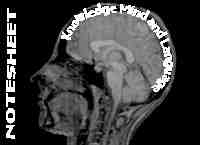A Language of Thought?
The Language of Thought hypothesis agrees with the Representative Theory of Thought in holding that thinking is dealing with representations , including representations of propositions in the brain, but adds to this the thesis that the representation of a proposition here must be structured : it must be structured just as a sentence expressing that proposition must be structured.
'... the logical form of the proposition believed will be copied in the structural form of the states in correspondence with them.' Dennett, expounding this theory but not necessarily subscribing to it, in Lycan, 2nd edition, p.85.
For example, take the belief passing through your mind that the cat is on the mat.
You might express the belief in words like this: 'The cat is on the mat.'
On the language of thought hypothesis, inside the brain there will be a physical state corresponding to this belief, and that state will be analysable into substates:for example, a substate for 'cat', another for 'mat' - and so on for the other 'components' of the belief.
ARGUMENTS OFFERED BY FODOR FOR THE CLAIM THAT MENTAL STATES REPRESENTING PROPOSITIONS MUST HAVE STRUCTURE
LANGUAGE IS 'PRODUCTIVE'
How many sentences would you understand should you be presented with them? Consider
- 'There is a snake in this room.'
- 'There are 2 snakes in this room'
- and so on
So: an infinite number.
That is, language is 'productive': you don't learn sentences as such, you somehow learn rules which enable you to generate an indefinite number of sentences.
The likeliest hypothesis: this is because language is structured. That e.g. sentences are made up of components which are semi-autonomous, i.e. can be used over and over in different sentences. Sentences are not blobs.
Is this a helpful analogy? :-
At the cheaper end of the market you can buy
- a plastic garage
- a plastic airport
- a plastic town
- a plastic harbour
- a plastic farm
Or you can buy sets of lego which enable you to build each of these things one after the other.
Lego is 'productive'.
LANGUAGE IS SYSTEMATIC
Language is systematic: 'the ability to produce/understand some of the sentences is intrinsically connected to the ability to produce/understand many of the others.' (Fodor, quoted by Jimmy Lenman, Lecture 2, page 19.)
You don't expect a native speaker to know how to say in English that John loves Mary without knowing how to say that Mary loves John.
The likeliest explanation: (again) language is structured. That e.g. sentences are made up of components which are semi-autonomous, i.e. can be used over and over in different sentences. Sentences are not blobs.
If language is like this, so must thoughts be. Because anything we can express in language we can think.
A METHODOLOGICAL ARGUMENT
The idea here is that there is structure in some of the things that we do, and that it would be surprising if there was no corresponding structure in the causation. If the causation is a matter of mental events, like intentions, we might expect those causes to be structured correspondingly.
Fodor defends a general methodological principle of the form: one type of explanation is preferable to another because it is simpler.
And it is simpler to have one integrated account of two happenings than to have two accounts which have nothing to do with each other.
For example, take the complex action of lifting the left foot and raising the right arm.
Take the explanation that this is produced by a single intention, to lift the left foot and raise the right arm.
The consider raising the left foot on its own. This could be put down to having the intention of raising the left foot.
Unless mental states (in this case intentions) were structured, these two accounts would not be related. They would be two independent accounts. But if they are structured, the second could be shown as part of the first.
END
Revised 04:02:03